八年级下册 Units 9-10学案(含答案)2025年中考人教版英语一轮教材梳理
文档属性
| 名称 | 八年级下册 Units 9-10学案(含答案)2025年中考人教版英语一轮教材梳理 |
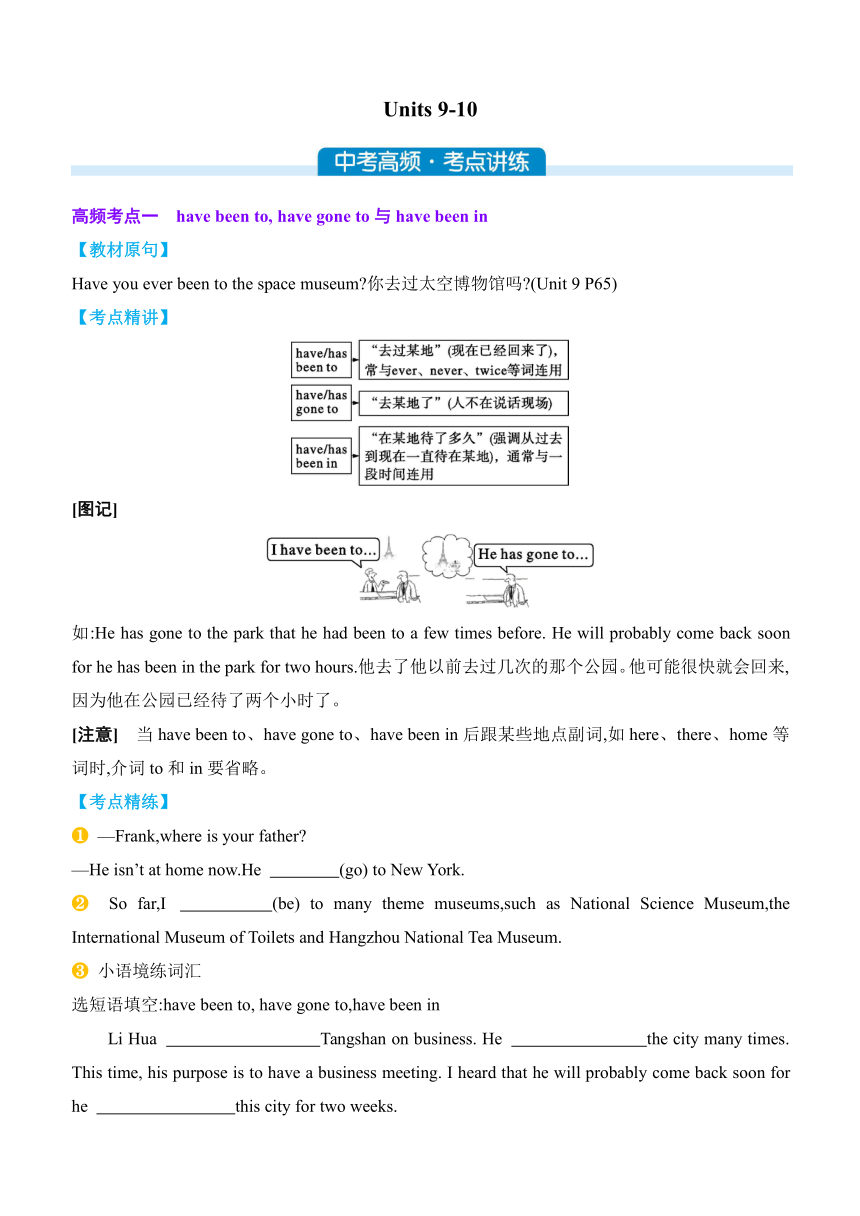
|
|
| 格式 | docx | ||
| 文件大小 | 393.5KB | ||
| 资源类型 | 教案 | ||
| 版本资源 | 人教新目标(Go for it)版 | ||
| 科目 | 英语 | ||
| 更新时间 | 2024-12-02 09:07:07 | ||
图片预览

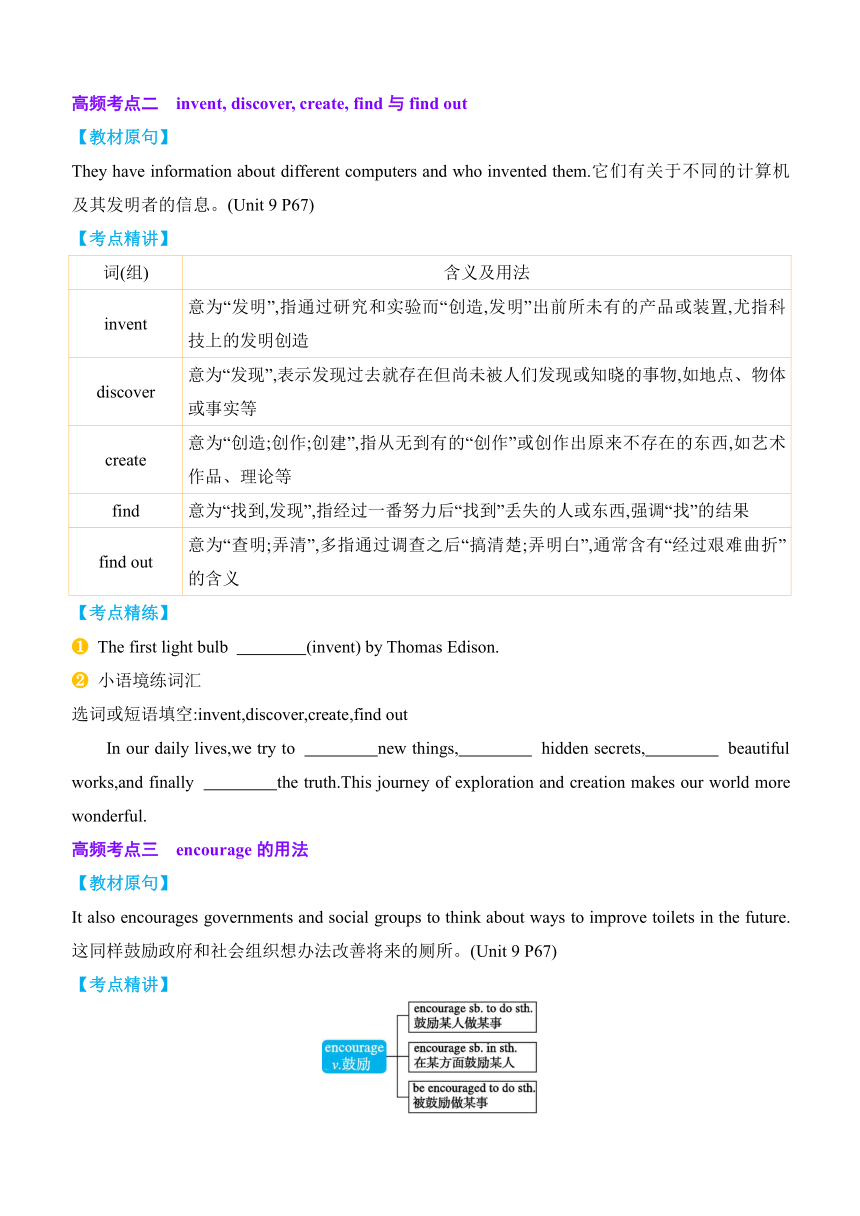
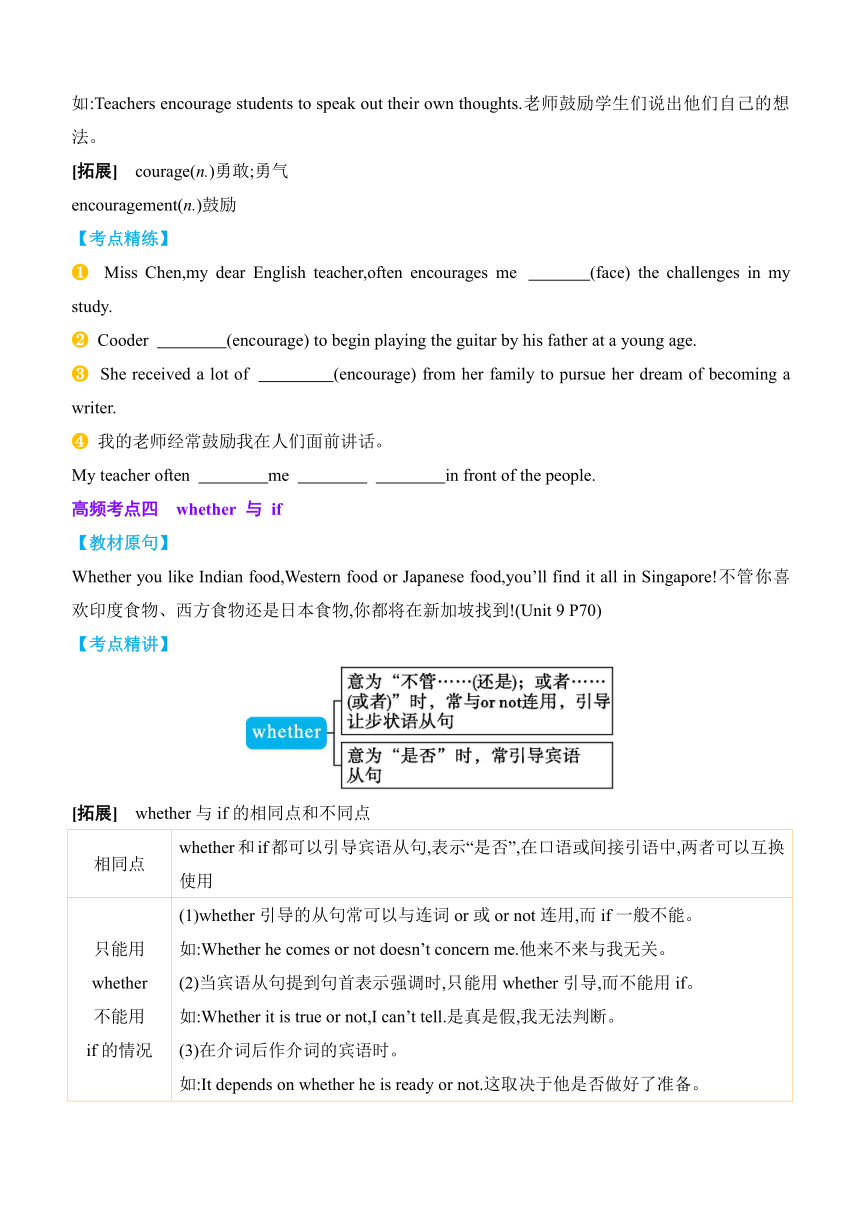
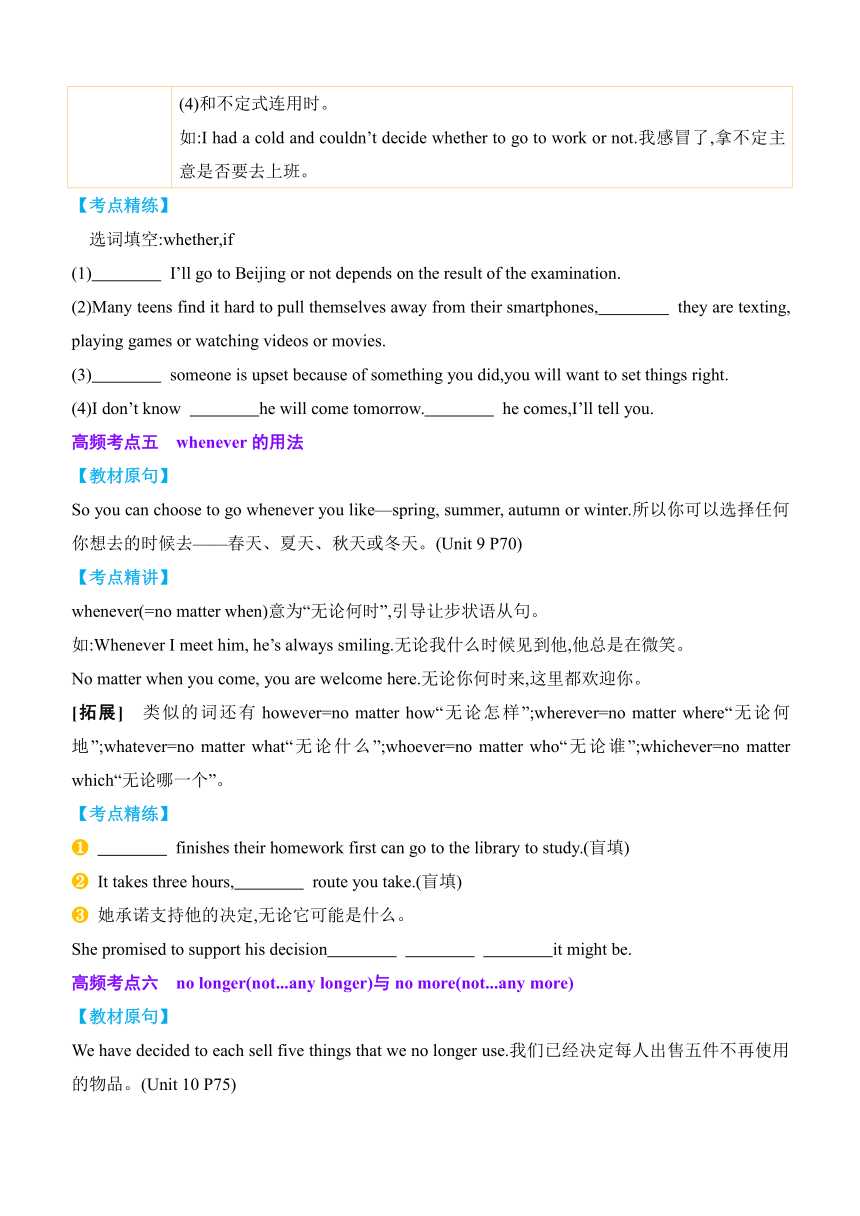
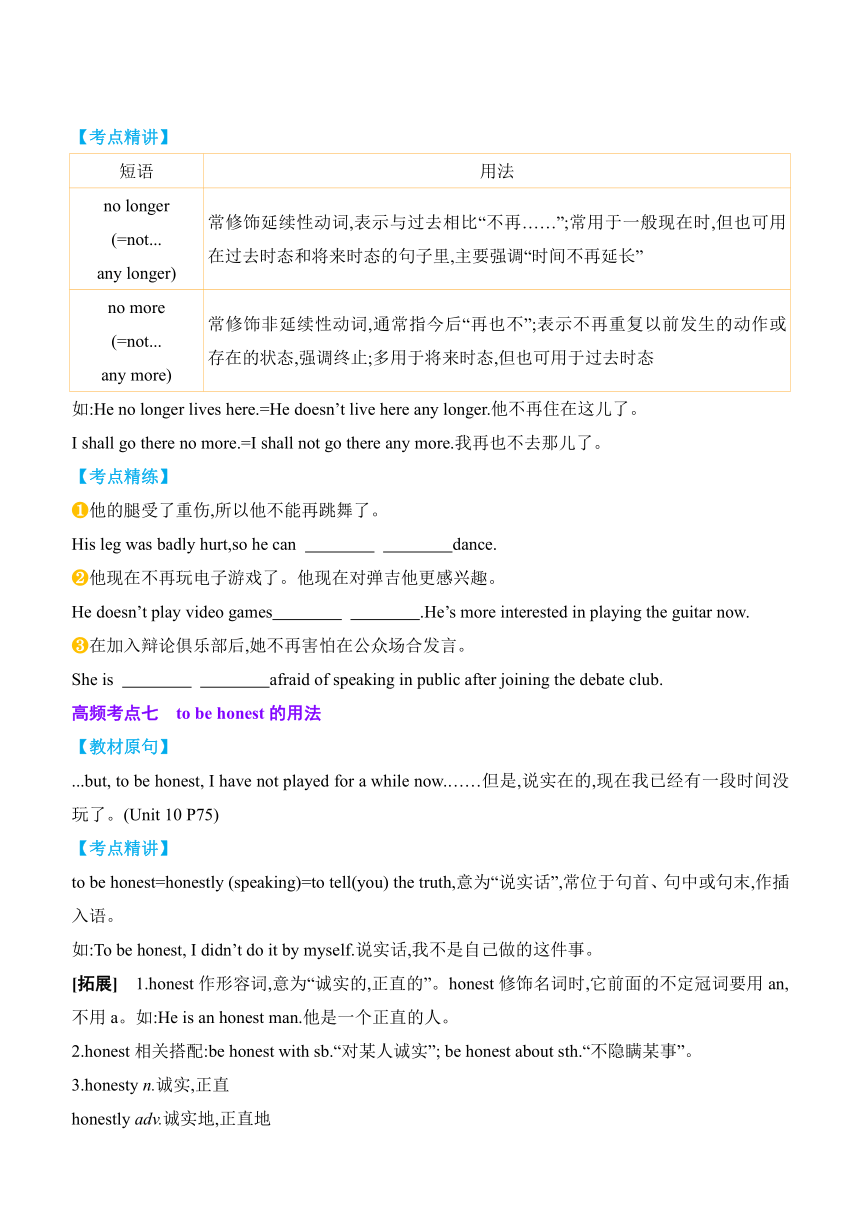
文档简介
Units 9-10
高频考点一 have been to, have gone to与have been in
【教材原句】
Have you ever been to the space museum 你去过太空博物馆吗 (Unit 9 P65)
【考点精讲】
[图记]
如:He has gone to the park that he had been to a few times before. He will probably come back soon for he has been in the park for two hours.他去了他以前去过几次的那个公园。他可能很快就会回来,因为他在公园已经待了两个小时了。
[注意] 当have been to、have gone to、have been in后跟某些地点副词,如here、there、home等词时,介词to和in要省略。
【考点精练】
—Frank,where is your father
—He isn’t at home now.He (go) to New York.
So far,I (be) to many theme museums,such as National Science Museum,the International Museum of Toilets and Hangzhou National Tea Museum.
小语境练词汇
选短语填空:have been to, have gone to,have been in
Li Hua Tangshan on business. He the city many times. This time, his purpose is to have a business meeting. I heard that he will probably come back soon for he this city for two weeks.
高频考点二 invent, discover, create, find与find out
【教材原句】
They have information about different computers and who invented them.它们有关于不同的计算机及其发明者的信息。(Unit 9 P67)
【考点精讲】
词(组) 含义及用法
invent 意为“发明”,指通过研究和实验而“创造,发明”出前所未有的产品或装置,尤指科技上的发明创造
discover 意为“发现”,表示发现过去就存在但尚未被人们发现或知晓的事物,如地点、物体或事实等
create 意为“创造;创作;创建”,指从无到有的“创作”或创作出原来不存在的东西,如艺术作品、理论等
find 意为“找到,发现”,指经过一番努力后“找到”丢失的人或东西,强调“找”的结果
find out 意为“查明;弄清”,多指通过调查之后“搞清楚;弄明白”,通常含有“经过艰难曲折”的含义
【考点精练】
The first light bulb (invent) by Thomas Edison.
小语境练词汇
选词或短语填空:invent,discover,create,find out
In our daily lives,we try to new things, hidden secrets, beautiful works,and finally the truth.This journey of exploration and creation makes our world more wonderful.
高频考点三 encourage的用法
【教材原句】
It also encourages governments and social groups to think about ways to improve toilets in the future.这同样鼓励政府和社会组织想办法改善将来的厕所。(Unit 9 P67)
【考点精讲】
如:Teachers encourage students to speak out their own thoughts.老师鼓励学生们说出他们自己的想法。
[拓展] courage(n.)勇敢;勇气
encouragement(n.)鼓励
【考点精练】
Miss Chen,my dear English teacher,often encourages me (face) the challenges in my study.
Cooder (encourage) to begin playing the guitar by his father at a young age.
She received a lot of (encourage) from her family to pursue her dream of becoming a writer.
我的老师经常鼓励我在人们面前讲话。
My teacher often me in front of the people.
高频考点四 whether 与 if
【教材原句】
Whether you like Indian food,Western food or Japanese food,you’ll find it all in Singapore!不管你喜欢印度食物、西方食物还是日本食物,你都将在新加坡找到!(Unit 9 P70)
【考点精讲】
[拓展] whether与if的相同点和不同点
相同点 whether和if都可以引导宾语从句,表示“是否”,在口语或间接引语中,两者可以互换使用
只能用 whether 不能用 if的情况 (1)whether引导的从句常可以与连词or或or not连用,而if一般不能。 如:Whether he comes or not doesn’t concern me.他来不来与我无关。 (2)当宾语从句提到句首表示强调时,只能用whether引导,而不能用if。 如:Whether it is true or not,I can’t tell.是真是假,我无法判断。 (3)在介词后作介词的宾语时。 如:It depends on whether he is ready or not.这取决于他是否做好了准备。 (4)和不定式连用时。 如:I had a cold and couldn’t decide whether to go to work or not.我感冒了,拿不定主意是否要去上班。
【考点精练】
选词填空:whether,if
(1) I’ll go to Beijing or not depends on the result of the examination.
(2)Many teens find it hard to pull themselves away from their smartphones, they are texting, playing games or watching videos or movies.
(3) someone is upset because of something you did,you will want to set things right.
(4)I don’t know he will come tomorrow. he comes,I’ll tell you.
高频考点五 whenever的用法
【教材原句】
So you can choose to go whenever you like—spring, summer, autumn or winter.所以你可以选择任何你想去的时候去——春天、夏天、秋天或冬天。(Unit 9 P70)
【考点精讲】
whenever(=no matter when)意为“无论何时”,引导让步状语从句。
如:Whenever I meet him, he’s always smiling.无论我什么时候见到他,他总是在微笑。
No matter when you come, you are welcome here.无论你何时来,这里都欢迎你。
[拓展] 类似的词还有however=no matter how“无论怎样”;wherever=no matter where“无论何地”;whatever=no matter what“无论什么”;whoever=no matter who“无论谁”;whichever=no matter which“无论哪一个”。
【考点精练】
finishes their homework first can go to the library to study.(盲填)
It takes three hours, route you take.(盲填)
她承诺支持他的决定,无论它可能是什么。
She promised to support his decision it might be.
高频考点六 no longer(not...any longer)与no more(not...any more)
【教材原句】
We have decided to each sell five things that we no longer use.我们已经决定每人出售五件不再使用的物品。(Unit 10 P75)
【考点精讲】
短语 用法
no longer (=not... any longer) 常修饰延续性动词,表示与过去相比“不再……”;常用于一般现在时,但也可用在过去时态和将来时态的句子里,主要强调“时间不再延长”
no more (=not... any more) 常修饰非延续性动词,通常指今后“再也不”;表示不再重复以前发生的动作或存在的状态,强调终止;多用于将来时态,但也可用于过去时态
如:He no longer lives here.=He doesn’t live here any longer.他不再住在这儿了。
I shall go there no more.=I shall not go there any more.我再也不去那儿了。
【考点精练】
他的腿受了重伤,所以他不能再跳舞了。
His leg was badly hurt,so he can dance.
他现在不再玩电子游戏了。他现在对弹吉他更感兴趣。
He doesn’t play video games .He’s more interested in playing the guitar now.
在加入辩论俱乐部后,她不再害怕在公众场合发言。
She is afraid of speaking in public after joining the debate club.
高频考点七 to be honest的用法
【教材原句】
...but, to be honest, I have not played for a while now.……但是,说实在的,现在我已经有一段时间没玩了。(Unit 10 P75)
【考点精讲】
to be honest=honestly (speaking)=to tell(you) the truth,意为“说实话”,常位于句首、句中或句末,作插入语。
如:To be honest, I didn’t do it by myself.说实话,我不是自己做的这件事。
[拓展] 1.honest作形容词,意为“诚实的,正直的”。honest修饰名词时,它前面的不定冠词要用an,不用a。如:He is an honest man.他是一个正直的人。
2.honest相关搭配:be honest with sb.“对某人诚实”; be honest about sth.“不隐瞒某事”。
3.honesty n.诚实,正直
honestly adv.诚实地,正直地
dishonest adj.不诚实的,欺诈的
【考点精练】
Teachers always stress the importance of (honest).
She felt sorry for giving a (honest) answer during the interview.
tell the truth, I fell asleep in the middle of her talk.(盲填)
老实说,她在剧中的表现比我预期的要好。
,her performance in the play was better than I expected.
高频考点八 regard的用法
【教材原句】
Zhong Wei regards such developments as important steps for his hometown.钟伟认为这样的发展对他的家乡来说是重要的一步。(Unit 10 P78)
【考点精讲】
regard作动词,意为“将……认为;把……视为”。regard/think of/treat/consider...as...意为“把……看作……”。另外,regard还意为“注视”。
如:She is regarded as one of the most famous writers in the world.她被认为是世界上最著名的作家之一。
[拓展] consider的用法:
【考点精练】
I regard my father my hero,and he gives me so much love.(盲填)
Drivers should consider (use) more electric cars instead of fuel cars.
Mo Yan has written a lot of great works so far.Many people consider him (be)a great writer.
Today more and more people in cities choose to raise pets and regard (they) as their close friends or family members.
Ⅰ.从方框中选择合适的单词并用其适当形式填空
believe,century,especial,when,most,perform
The Great Wall of China has been standing for .
The musician is good at playing traditional musical instruments, pipa and guzheng.
Jerry played the guitar on the show,and his was so wonderful that people cheered happily.
It’s that all the dishes for dinner were cooked by the only ten-year-old boy.
You can visit my hometown you like,because you are always welcome.
Alex and his friends are out during holidays.
Ⅱ.用所给词的正确形式填空
He said nothing,but (simple) nodded,as if understanding perfectly.
The poor little cat hurt (it) when it fell off the building.
The artists are (encourage) to tell good Chinese stories in their favorite art forms.
Ningbo automatic test of listening and speaking is (hold) in March every year.
Ⅲ.根据句意,填入适当的单词
In this country students can choose courses according their interests.
We told Lisa couple of educational stories to encourage her to face the challenges.
My mobile phone is too slow. I think I need to clear some space in it.
Zhong Nanshan is considered one of the best doctors in China.
Ⅳ.短文填空
Do you love to live in the countryside or in big 1. (city) Many people often leave their hometowns 2. (work) in cities.Zhang Bin is 3. 46-year-old man from Huaihua.He is one such person.He 4. (work) in a shoe factory in Wenzhou and he 5. (real) misses his hometown.
More and more hometowns 6. (develop) faster than before.Large hospitals and new schools 7. (build).There are many new roads and bridges.This has made traveling between villages and cities much 8. (easy).Thanks 9. the new roads around 10. (he) village,Zhang Bin is able to open an online shop that sells delicious food 11. his hometown.
Zhang Bin thinks the 12. (change) are great in his hometown.He is very happy about the new school in his village.13. ,he believes that one thing will never change—the 14.
(love) old tree.His hometown is the place that holds his best 15. (memory).
Ⅴ.情景交际
A:How long have you lived in China,Peter
B:I’ve been here for about one month.
A:Have you got used to Chinese food
B:1. Chinese food is really different from Western food.But I’d like to try as many famous Chinese dishes as I can.
A:Sounds good.2.
B:I like sweet and sour pork best.I eat it almost every day.
A:Have you tried traditional Chinese dumplings yet
B:Yes,I tried once.They are delicious but difficult to eat with chopsticks.
A:You know,3. If you do,you’ll give your Chinese friends quite a surprise.
B:That’s true.
A:4. If not,I’d like to treat you to a meal at Quanjude,a famous duck restaurant.
B:Thanks.I have tried it.But if you treat me to the hot pot,I will be glad to go.
A:5. Let’s go to Haidilao,one of the most famous hot pot restaurants.
【详解答案】
中考高频·考点讲练
高频考点一
1.has gone 2.have been
3.has gone to;has been to;has been in
高频考点二
1.was invented
2.invent;discover;create;find out
高频考点三
1.to face 2.was encouraged
3.encouragement 4.encourages;to speak
高频考点四
(1)Whether (2)whether (3)If
(4)whether/if;If
高频考点五
1.Whoever 2.whichever
3.no matter what
高频考点六
1.no longer 2.any more 3.no more
高频考点七
1.honesty 2.dishonest 3.To
4.To be honest
高频考点八
1.as 2.using 3.to be 4.them
重难考点·集训突破
Ⅰ.1.centuries 2.especially 3.performance
4.unbelievable 5.whenever 6.mostly
Ⅱ.1.simply 2.itself 3.encouraged 4.held
Ⅲ.1.to 2.a 3.out 4.as
Ⅳ.1.cities 2.to work 3.a 4.works
5.really 6.are developing 7.are built
8.easier 9.to 10.his 11.from
12.changes 13.However 14.lovely
15.memories
Ⅴ.1.No,I haven’t.
2.What’s your favorite food
3.it is hard for foreigners to eat with chopsticks.
4.Have you tried roast duck
5.That’s a deal.
高频考点一 have been to, have gone to与have been in
【教材原句】
Have you ever been to the space museum 你去过太空博物馆吗 (Unit 9 P65)
【考点精讲】
[图记]
如:He has gone to the park that he had been to a few times before. He will probably come back soon for he has been in the park for two hours.他去了他以前去过几次的那个公园。他可能很快就会回来,因为他在公园已经待了两个小时了。
[注意] 当have been to、have gone to、have been in后跟某些地点副词,如here、there、home等词时,介词to和in要省略。
【考点精练】
—Frank,where is your father
—He isn’t at home now.He (go) to New York.
So far,I (be) to many theme museums,such as National Science Museum,the International Museum of Toilets and Hangzhou National Tea Museum.
小语境练词汇
选短语填空:have been to, have gone to,have been in
Li Hua Tangshan on business. He the city many times. This time, his purpose is to have a business meeting. I heard that he will probably come back soon for he this city for two weeks.
高频考点二 invent, discover, create, find与find out
【教材原句】
They have information about different computers and who invented them.它们有关于不同的计算机及其发明者的信息。(Unit 9 P67)
【考点精讲】
词(组) 含义及用法
invent 意为“发明”,指通过研究和实验而“创造,发明”出前所未有的产品或装置,尤指科技上的发明创造
discover 意为“发现”,表示发现过去就存在但尚未被人们发现或知晓的事物,如地点、物体或事实等
create 意为“创造;创作;创建”,指从无到有的“创作”或创作出原来不存在的东西,如艺术作品、理论等
find 意为“找到,发现”,指经过一番努力后“找到”丢失的人或东西,强调“找”的结果
find out 意为“查明;弄清”,多指通过调查之后“搞清楚;弄明白”,通常含有“经过艰难曲折”的含义
【考点精练】
The first light bulb (invent) by Thomas Edison.
小语境练词汇
选词或短语填空:invent,discover,create,find out
In our daily lives,we try to new things, hidden secrets, beautiful works,and finally the truth.This journey of exploration and creation makes our world more wonderful.
高频考点三 encourage的用法
【教材原句】
It also encourages governments and social groups to think about ways to improve toilets in the future.这同样鼓励政府和社会组织想办法改善将来的厕所。(Unit 9 P67)
【考点精讲】
如:Teachers encourage students to speak out their own thoughts.老师鼓励学生们说出他们自己的想法。
[拓展] courage(n.)勇敢;勇气
encouragement(n.)鼓励
【考点精练】
Miss Chen,my dear English teacher,often encourages me (face) the challenges in my study.
Cooder (encourage) to begin playing the guitar by his father at a young age.
She received a lot of (encourage) from her family to pursue her dream of becoming a writer.
我的老师经常鼓励我在人们面前讲话。
My teacher often me in front of the people.
高频考点四 whether 与 if
【教材原句】
Whether you like Indian food,Western food or Japanese food,you’ll find it all in Singapore!不管你喜欢印度食物、西方食物还是日本食物,你都将在新加坡找到!(Unit 9 P70)
【考点精讲】
[拓展] whether与if的相同点和不同点
相同点 whether和if都可以引导宾语从句,表示“是否”,在口语或间接引语中,两者可以互换使用
只能用 whether 不能用 if的情况 (1)whether引导的从句常可以与连词or或or not连用,而if一般不能。 如:Whether he comes or not doesn’t concern me.他来不来与我无关。 (2)当宾语从句提到句首表示强调时,只能用whether引导,而不能用if。 如:Whether it is true or not,I can’t tell.是真是假,我无法判断。 (3)在介词后作介词的宾语时。 如:It depends on whether he is ready or not.这取决于他是否做好了准备。 (4)和不定式连用时。 如:I had a cold and couldn’t decide whether to go to work or not.我感冒了,拿不定主意是否要去上班。
【考点精练】
选词填空:whether,if
(1) I’ll go to Beijing or not depends on the result of the examination.
(2)Many teens find it hard to pull themselves away from their smartphones, they are texting, playing games or watching videos or movies.
(3) someone is upset because of something you did,you will want to set things right.
(4)I don’t know he will come tomorrow. he comes,I’ll tell you.
高频考点五 whenever的用法
【教材原句】
So you can choose to go whenever you like—spring, summer, autumn or winter.所以你可以选择任何你想去的时候去——春天、夏天、秋天或冬天。(Unit 9 P70)
【考点精讲】
whenever(=no matter when)意为“无论何时”,引导让步状语从句。
如:Whenever I meet him, he’s always smiling.无论我什么时候见到他,他总是在微笑。
No matter when you come, you are welcome here.无论你何时来,这里都欢迎你。
[拓展] 类似的词还有however=no matter how“无论怎样”;wherever=no matter where“无论何地”;whatever=no matter what“无论什么”;whoever=no matter who“无论谁”;whichever=no matter which“无论哪一个”。
【考点精练】
finishes their homework first can go to the library to study.(盲填)
It takes three hours, route you take.(盲填)
她承诺支持他的决定,无论它可能是什么。
She promised to support his decision it might be.
高频考点六 no longer(not...any longer)与no more(not...any more)
【教材原句】
We have decided to each sell five things that we no longer use.我们已经决定每人出售五件不再使用的物品。(Unit 10 P75)
【考点精讲】
短语 用法
no longer (=not... any longer) 常修饰延续性动词,表示与过去相比“不再……”;常用于一般现在时,但也可用在过去时态和将来时态的句子里,主要强调“时间不再延长”
no more (=not... any more) 常修饰非延续性动词,通常指今后“再也不”;表示不再重复以前发生的动作或存在的状态,强调终止;多用于将来时态,但也可用于过去时态
如:He no longer lives here.=He doesn’t live here any longer.他不再住在这儿了。
I shall go there no more.=I shall not go there any more.我再也不去那儿了。
【考点精练】
他的腿受了重伤,所以他不能再跳舞了。
His leg was badly hurt,so he can dance.
他现在不再玩电子游戏了。他现在对弹吉他更感兴趣。
He doesn’t play video games .He’s more interested in playing the guitar now.
在加入辩论俱乐部后,她不再害怕在公众场合发言。
She is afraid of speaking in public after joining the debate club.
高频考点七 to be honest的用法
【教材原句】
...but, to be honest, I have not played for a while now.……但是,说实在的,现在我已经有一段时间没玩了。(Unit 10 P75)
【考点精讲】
to be honest=honestly (speaking)=to tell(you) the truth,意为“说实话”,常位于句首、句中或句末,作插入语。
如:To be honest, I didn’t do it by myself.说实话,我不是自己做的这件事。
[拓展] 1.honest作形容词,意为“诚实的,正直的”。honest修饰名词时,它前面的不定冠词要用an,不用a。如:He is an honest man.他是一个正直的人。
2.honest相关搭配:be honest with sb.“对某人诚实”; be honest about sth.“不隐瞒某事”。
3.honesty n.诚实,正直
honestly adv.诚实地,正直地
dishonest adj.不诚实的,欺诈的
【考点精练】
Teachers always stress the importance of (honest).
She felt sorry for giving a (honest) answer during the interview.
tell the truth, I fell asleep in the middle of her talk.(盲填)
老实说,她在剧中的表现比我预期的要好。
,her performance in the play was better than I expected.
高频考点八 regard的用法
【教材原句】
Zhong Wei regards such developments as important steps for his hometown.钟伟认为这样的发展对他的家乡来说是重要的一步。(Unit 10 P78)
【考点精讲】
regard作动词,意为“将……认为;把……视为”。regard/think of/treat/consider...as...意为“把……看作……”。另外,regard还意为“注视”。
如:She is regarded as one of the most famous writers in the world.她被认为是世界上最著名的作家之一。
[拓展] consider的用法:
【考点精练】
I regard my father my hero,and he gives me so much love.(盲填)
Drivers should consider (use) more electric cars instead of fuel cars.
Mo Yan has written a lot of great works so far.Many people consider him (be)a great writer.
Today more and more people in cities choose to raise pets and regard (they) as their close friends or family members.
Ⅰ.从方框中选择合适的单词并用其适当形式填空
believe,century,especial,when,most,perform
The Great Wall of China has been standing for .
The musician is good at playing traditional musical instruments, pipa and guzheng.
Jerry played the guitar on the show,and his was so wonderful that people cheered happily.
It’s that all the dishes for dinner were cooked by the only ten-year-old boy.
You can visit my hometown you like,because you are always welcome.
Alex and his friends are out during holidays.
Ⅱ.用所给词的正确形式填空
He said nothing,but (simple) nodded,as if understanding perfectly.
The poor little cat hurt (it) when it fell off the building.
The artists are (encourage) to tell good Chinese stories in their favorite art forms.
Ningbo automatic test of listening and speaking is (hold) in March every year.
Ⅲ.根据句意,填入适当的单词
In this country students can choose courses according their interests.
We told Lisa couple of educational stories to encourage her to face the challenges.
My mobile phone is too slow. I think I need to clear some space in it.
Zhong Nanshan is considered one of the best doctors in China.
Ⅳ.短文填空
Do you love to live in the countryside or in big 1. (city) Many people often leave their hometowns 2. (work) in cities.Zhang Bin is 3. 46-year-old man from Huaihua.He is one such person.He 4. (work) in a shoe factory in Wenzhou and he 5. (real) misses his hometown.
More and more hometowns 6. (develop) faster than before.Large hospitals and new schools 7. (build).There are many new roads and bridges.This has made traveling between villages and cities much 8. (easy).Thanks 9. the new roads around 10. (he) village,Zhang Bin is able to open an online shop that sells delicious food 11. his hometown.
Zhang Bin thinks the 12. (change) are great in his hometown.He is very happy about the new school in his village.13. ,he believes that one thing will never change—the 14.
(love) old tree.His hometown is the place that holds his best 15. (memory).
Ⅴ.情景交际
A:How long have you lived in China,Peter
B:I’ve been here for about one month.
A:Have you got used to Chinese food
B:1. Chinese food is really different from Western food.But I’d like to try as many famous Chinese dishes as I can.
A:Sounds good.2.
B:I like sweet and sour pork best.I eat it almost every day.
A:Have you tried traditional Chinese dumplings yet
B:Yes,I tried once.They are delicious but difficult to eat with chopsticks.
A:You know,3. If you do,you’ll give your Chinese friends quite a surprise.
B:That’s true.
A:4. If not,I’d like to treat you to a meal at Quanjude,a famous duck restaurant.
B:Thanks.I have tried it.But if you treat me to the hot pot,I will be glad to go.
A:5. Let’s go to Haidilao,one of the most famous hot pot restaurants.
【详解答案】
中考高频·考点讲练
高频考点一
1.has gone 2.have been
3.has gone to;has been to;has been in
高频考点二
1.was invented
2.invent;discover;create;find out
高频考点三
1.to face 2.was encouraged
3.encouragement 4.encourages;to speak
高频考点四
(1)Whether (2)whether (3)If
(4)whether/if;If
高频考点五
1.Whoever 2.whichever
3.no matter what
高频考点六
1.no longer 2.any more 3.no more
高频考点七
1.honesty 2.dishonest 3.To
4.To be honest
高频考点八
1.as 2.using 3.to be 4.them
重难考点·集训突破
Ⅰ.1.centuries 2.especially 3.performance
4.unbelievable 5.whenever 6.mostly
Ⅱ.1.simply 2.itself 3.encouraged 4.held
Ⅲ.1.to 2.a 3.out 4.as
Ⅳ.1.cities 2.to work 3.a 4.works
5.really 6.are developing 7.are built
8.easier 9.to 10.his 11.from
12.changes 13.However 14.lovely
15.memories
Ⅴ.1.No,I haven’t.
2.What’s your favorite food
3.it is hard for foreigners to eat with chopsticks.
4.Have you tried roast duck
5.That’s a deal.
